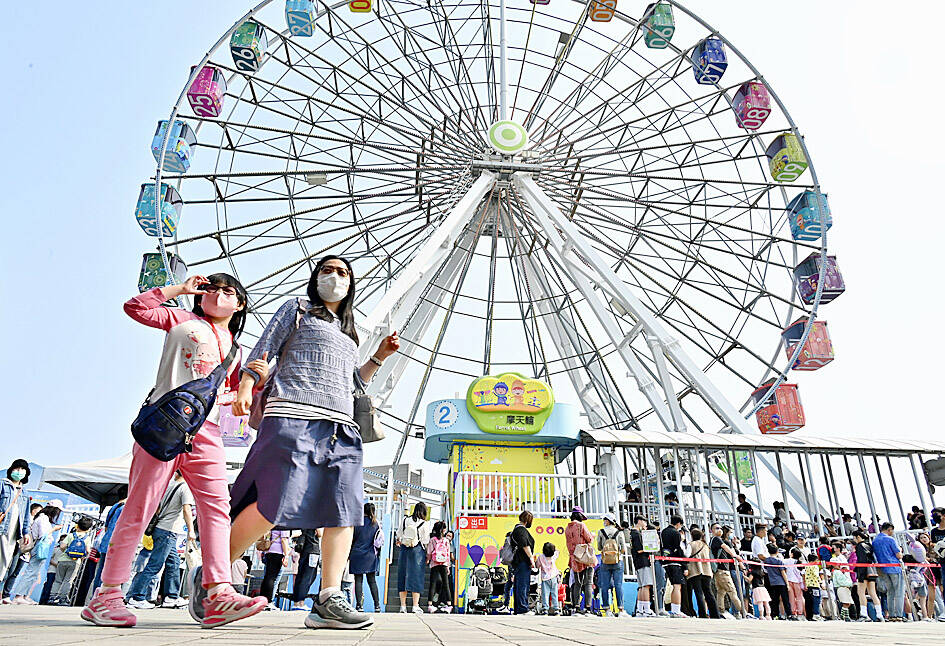The Legislative Yuan yesterday passed on third reading amendments that would increase fines for ticket scalping, noisy behavior and stalking.
Following changes to the Social Order Maintenance Act (社會秩序維護法), the maximum penalty for purchasing transportation or entertainment tickets with the intention to resell them for profit is to increase from NT$18,000 to NT$30,000.
The penalty for disturbing public tranquility and getting drunk and rowdy, despite having been dissuaded, would also increase from NT$6,000 to NT$10,000.

Photo: Tu Chien-jung, Taipei Times
Another amendment, proposed by Chinese Nationalist Party (KMT) legislators Lu Ming-che (魯明哲) and Yen Kuan-heng (顏寬恒), would increase fines for stalking without justifiable reason, despite having been dissuaded, from NT$3,000 to NT$30,000.
Previously, several lawmakers, including independent Legislator May Chin (高金素梅) and KMT legislators Lo Ting-wei (羅廷瑋), Wang Hung-wei (王鴻薇) and Lin Szu-ming (林思銘), proposed expanding the definition of “ticket scalping.”
Competent authorities are required to study and suggest legal amendments on a potential expanded definition, including food, hospitality and medical care, within the next two months.
The Legislative Yuan also passed an additional resolution specifying that minor violations be addressed through administrative penalties.
Scalping tickets for arts, cultural performances and sporting events are subject to penalties specified in the Development of the Cultural and Creative Industries Act (文化創意產業發展法) and the Sports Industry Development Act (運動產業發展條例).
To curb scalping by targeting the source and increasing oversight, the resolution states that authorities overseeing tickets or vouchers for medical or hospitality services have to discuss and draft amendments within two months to stop ticket scalping.
The Ministry of the Interior said in a statement that although tickets for arts or sporting events are already covered by anti-scalping regulations in other laws, management authorities should consider ways of amending regulations to stop the practice.

The Coast Guard Administration (CGA) yesterday said it had deployed patrol vessels to expel a China Coast Guard ship and a Chinese fishing boat near Pratas Island (Dongsha Island, 東沙群島) in the South China Sea. The China Coast Guard vessel was 28 nautical miles (52km) northeast of Pratas at 6:15am on Thursday, approaching the island’s restricted waters, which extend 24 nautical miles from its shoreline, the CGA’s Dongsha-Nansha Branch said in a statement. The Tainan, a 2,000-tonne cutter, was deployed by the CGA to shadow the Chinese ship, which left the area at 2:39pm on Friday, the statement said. At 6:31pm on Friday,

The Chinese People’s Liberation Army Navy’s (PLAN) third aircraft carrier, the Fujian, would pose a steep challenge to Taiwan’s ability to defend itself against a full-scale invasion, a defense expert said yesterday. Institute of National Defense and Security Research analyst Chieh Chung (揭仲) made the comment hours after the PLAN confirmed the carrier recently passed through the Taiwan Strait to conduct “scientific research tests and training missions” in the South China Sea. China has two carriers in operation — the Liaoning and the Shandong — with the Fujian undergoing sea trials. Although the PLAN needs time to train the Fujian’s air wing and

Taiwanese celebrities Hank Chen (陳漢典) and Lulu Huang (黃路梓茵) announced yesterday that they are planning to marry. Huang announced and posted photos of their engagement to her social media pages yesterday morning, joking that the pair were not just doing marketing for a new show, but “really getting married.” “We’ve decided to spend all of our future happy and hilarious moments together,” she wrote. The announcement, which was later confirmed by the talent agency they share, appeared to come as a surprise even to those around them, with veteran TV host Jacky Wu (吳宗憲) saying he was “totally taken aback” by the news. Huang,

The American Institute in Taiwan (AIT) put Taiwan in danger, Ma Ying-jeou Foundation director Hsiao Hsu-tsen (蕭旭岑) said yesterday, hours after the de facto US embassy said that Beijing had misinterpreted World War II-era documents to isolate Taiwan. The AIT’s comments harmed the Republic of China’s (ROC) national interests and contradicted a part of the “six assurances” stipulating that the US would not change its official position on Taiwan’s sovereignty, Hsiao said. The “six assurances,” which were given by then-US president Ronald Reagan to Taiwan in 1982, say that Washington would not set a date for ending arm sales to Taiwan, consult